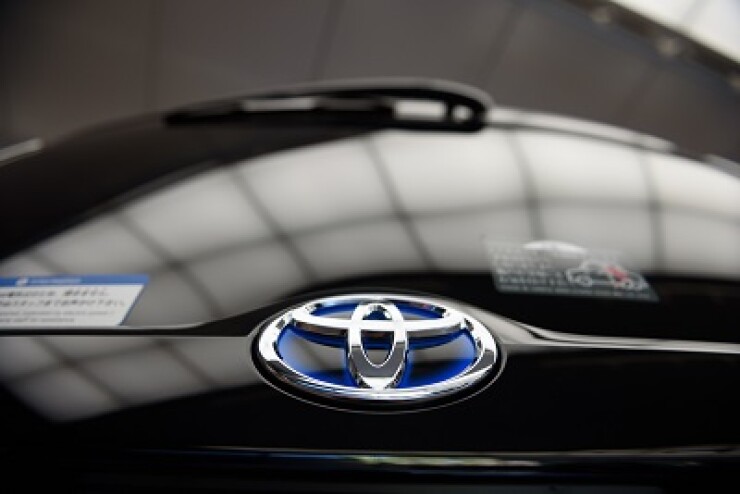Nissan Motor Acceptance Corp. and Toyota Motor Credit Corp. are joining the parade of automotive captive-finance lenders launching plans to sponsor a prime auto ABS transaction in the midst of the COVID-19 pandemic.
Like those for
Toyota’s collateral pool for Toyota Auto Receivables 2020-B Owner Trust, which will market $800 million or $1.2 billion in notes, is largely similar to its recent deals – but is expected to have slightly higher losses due to the near-term economic stresses of the coronavirus outbreak.
Also proposing a new prime-auto ABS deal is the used-car retail chain CarMax, which plans to issue between $800 million and $1.16 billion in new notes.
Nissan
According to ratings agency presale reports, NMAC is upping overcollateralization, increasing its yield-supplement overcollateralization amount (or the YSOA) in addition to boosting a reserve account in the new transaction compared to its prior $1.25 billion NAROT 2019-C securitization that priced last October.
The NAROT 2020-A trust will hold millions more in a reserve account now totaling 1% of the initial adjusted pool balance (up from 0.25% last year) and overcollateralize the deal by 4.5%, compared to 4% in NAROT 2019-A – producing an initial OC level of 5.5% instead of 4.25% in the prior deal.
The new transaction will feature either 37,638 loan accounts (totaling $839.74 million) or 50,112 (with a balance of $1.119 billion) for new- and used Nissan and Infiniti vehicles sold through U.S. Nissan dealers.

Also, NMAC will provide a higher YSOA discount rate of 6.1%, above the 5.75% from NAROT 2019-A. (That means the trust will cover the difference for any discounted APR provided to a borrower below the 6.1% rate minimum the portfolio is required to provide to investors).
Despite the extra cushion for investors, both S&P Global Ratings is forecasting higher expected losses in the new deal over NMAC’s previous retail-loan securitizations. For S&P, the 1.5%-1.7% range is up from 1.05%-1.15%.
The NAROT 2020-A transaction features all senior term notes totaling $629 million or $838 million (if upsized) with preliminary AAA ratings, as well as a $121 million or $162 million money-market tranche with an A-1+ short-term rating.
The deal arrives as Nissan Motor Acceptance (BBB+) is under review for a potential downgrade by S&P for COVID-19-related stresses. The lender, although possessing an “extremely healthy financing standing” was previously downgraded from an ‘A’ rating in December due to the downgrade for Japanese parent Nissan Motor Co. for sluggish earnings.
Toyota
Toyota Motor Credit’s (TMCC) second prime-loan securitization of the year largely maps its first deal, according to Moody’s Investors Service. The weighted-average FICO of 767, APR of 3.25% and 79% proportion of new-car loans issued through U.S. Toyota dealers are factors “consistent of recent [Toyota trust] transactions and TMCC’s underwriting practices,” noted Moody’s.
However, the pandemic-related stressed affecting the global automotive industry have produced higher expected losses under Moody’s ratings analysis. The cumulative net loss for the Toyota Auto Owner Trust 2020-B deal is expected to be 0.85%, compared to 0.825% than TOAT 2020-A.

Toyota plans to offer mostly triple-A rated senior term notes (preliminary ratings), along with a money-market tranche with Moody’s highest P-1 rating. All the senior notes benefit from 3.5% credit enhancement.
A Class B subordinate note tranche (either $20 million or $30 million) will be issued as well. Those notes are unrated by Moody’s.
The loan pools totaling $850.2 million or $1.275 billion have similar seasoning, of 17 months and 16 months, respectively.
CarMax
CarMax Auto Owner Trust 2020-2 is the second used-car prime auto loan deal of the year marketed by CarMax Auto Finance, the loan servicing and financing arm of CarMax Business Services.
The $800 million CarMax Auto Owner Trust 2020-2 deal has a senior note stack with early AAA term-note ratings (as well as an F1+ short-term rating for a money-market tranche) and the benefit of 11% credit enhancement support in the form of overcollateralization, a reserve account and subordination of three junior-note classes, according to Fitch Ratings. (Excess spread is excluded from the credit enhancement).

The pool of 52,633 contracts with an average current balance of $15,291 have a weighted average FICO of 715, including 37% of all accounts with borrower FICOs in excess of 750. The loans are seasoned an average of 6.7 months, with remaining average terms of 59.4 months. The seasoning is the highest-level of loan aging since 2009 for CarMax.
Loan-to-value ratios of 93.8% are in line with previous CarMax deals.
The forward-looking cumulative net loss expectation is 2.8%, based on a “greater emphasis on recessionary performance” under Fitch’s analysis that includes a first-half economic contractions with a rapid spike in unemployment, followed by the beginning of a third-quarter economic recovery.





